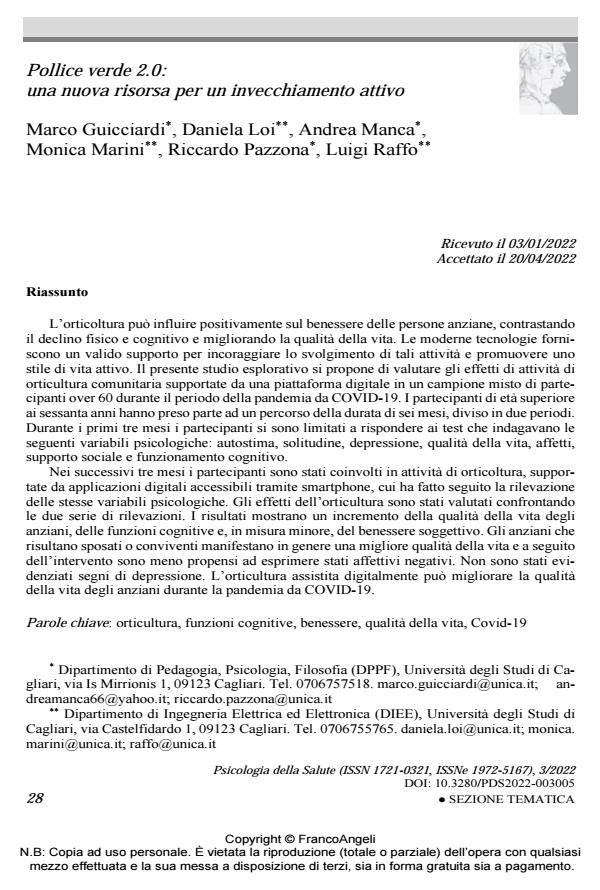Pollice verde 2.0: una nuova risorsa per un invecchiamento attivo
Titolo Rivista PSICOLOGIA DELLA SALUTE
Autori/Curatori Marco Guicciardi, Daniela Loi, Andrea Manca, Monica Marini, Riccardo Pazzona, Luigi Raffo
Anno di pubblicazione 2022 Fascicolo 2022/3
Lingua Italiano Numero pagine 12 P. 28-39 Dimensione file 242 KB
DOI 10.3280/PDS2022-003005
Il DOI è il codice a barre della proprietà intellettuale: per saperne di più
clicca qui
Qui sotto puoi vedere in anteprima la prima pagina di questo articolo.
Se questo articolo ti interessa, lo puoi acquistare (e scaricare in formato pdf) seguendo le facili indicazioni per acquistare il download credit. Acquista Download Credits per scaricare questo Articolo in formato PDF

FrancoAngeli è membro della Publishers International Linking Association, Inc (PILA)associazione indipendente e non profit per facilitare (attraverso i servizi tecnologici implementati da CrossRef.org) l’accesso degli studiosi ai contenuti digitali nelle pubblicazioni professionali e scientifiche
L’orticoltura può influire positivamente sul benessere delle persone anziane, contrastando il declino fisico e cognitivo e migliorando la qualità della vita. Le moderne tecnologie fornisco-no un valido supporto per incoraggiare lo svolgimento di tali attività e promuovere uno stile di vita attivo. Il presente studio esplorativo si propone di valutare gli effetti di attività di orticultura comunitaria supportate da una piattaforma digitale in un campione misto di partecipanti over 60 durante il periodo della pandemia da COVID-19. I partecipanti di età superiore ai sessanta anni hanno preso parte ad un percorso della durata di sei mesi, diviso in due periodi. Durante i primi tre mesi i partecipanti si sono limitati a rispondere ai test che indagavano le seguenti va-riabili psicologiche: autostima, solitudine, depressione, qualità della vita, affetti, supporto sociale e funzionamento cognitivo. Nei successivi tre mesi i partecipanti sono stati coinvolti in attività di orticoltura, supportate da applicazioni digitali accessibili tramite smartphone, cui ha fatto seguito la rilevazione delle stesse variabili psicologiche. Gli effetti dell’orticultura sono stati valutati confrontando le due serie di rilevazioni. I risultati mostrano un incremento della qualità della vita degli anziani, delle funzioni cognitive e, in misura minore, del benessere soggettivo. Gli anziani che risultano spo-sati o conviventi manifestano in genere una migliore qualità della vita e a seguito dell’intervento sono meno propensi ad esprimere stati affettivi negativi. Non sono stati evidenziati segni di depressione. L’orticultura assistita digitalmente può migliorare la qualità della vita degli anziani durante la pandemia da COVID-19.
Parole chiave:orticultura, funzioni cognitive, benessere, qualità della vita, Covid-19
Marco Guicciardi, Daniela Loi, Andrea Manca, Monica Marini, Riccardo Pazzona, Luigi Raffo, Pollice verde 2.0: una nuova risorsa per un invecchiamento attivo in "PSICOLOGIA DELLA SALUTE" 3/2022, pp 28-39, DOI: 10.3280/PDS2022-003005